A Spirit Unbounded
By Leong Imm Chon (梁嫣親)
Photos by Hsiao Yiu-hwa (蕭耀華)
Translated by Wu Hsiao-ting (吳曉婷)
A Spirit Unbounded
By Leong Imm Chon (梁嫣親)
Photos by Hsiao Yiu-hwa (蕭耀華)
Translated by Wu Hsiao-ting (吳曉婷)
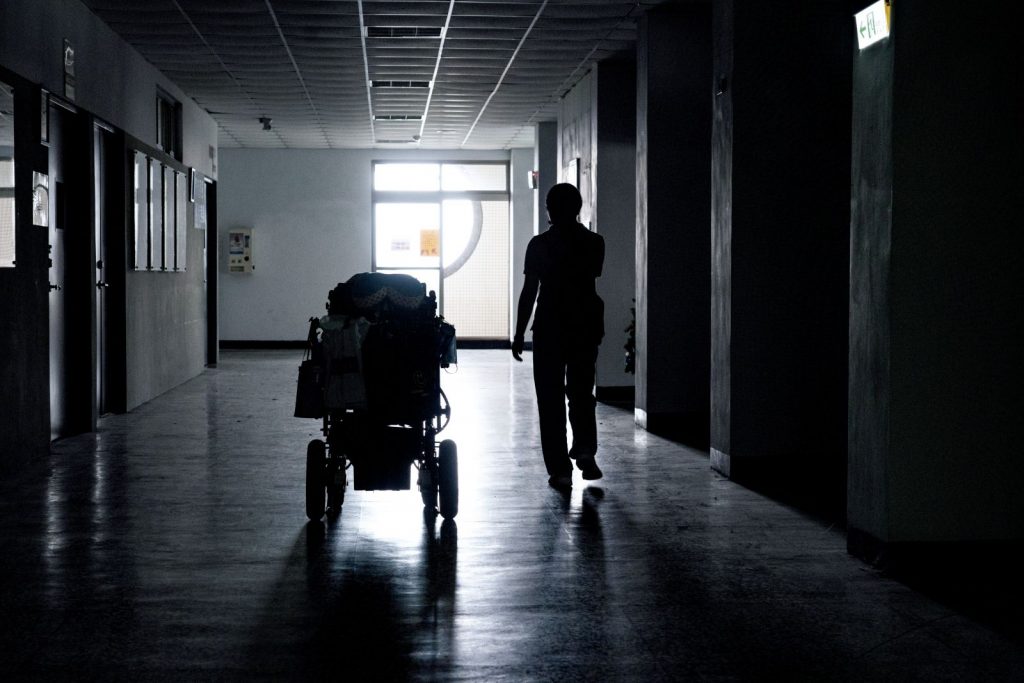
Chen Jing-wei drives his wheelchair to his next class. Finishing his college education is one of his dreams. Every day that brings him closer to the fulfillment of his dreams is a beautiful day for him.
I wonder how much longer I will live. A question like this rarely occurs to young people, for most of whom death is still far away. However, Chen Jing-wei (陳景維), 21, often asks himself this question.
Jing-wei was diagnosed with spinal muscular atrophy not long after he was born. His four limbs and trunk suffer from severe weakness, and his spine is badly misshapen. His distorted spine compresses his organs, which affects the ability of his heart and lungs to function normally. He is getting weaker day by day. But despite all that, he faces his debilitating disease with optimism. He lives each day as if it were his last, racing against time to make his dreams a reality.
Controlling His Weight
Jing-wei lives with his grandparents. His parents entrusted him to their care after they divorced. He can't take care of himself and so he must depend on his grandmother, Li Mei-hua (李美華), for his daily needs. She helps him eat, wash himself, and get in and out of his wheelchair. Her room has a door that leads to his room, and she even goes to him at irregular intervals at night to help him turn over in bed.
Jing-wei was in the hospital frequently when he was a child due to a weak immune system. Mei-hua had to take care of him at the hospital and run the household at the same time. She was often run ragged going back and forth between the two places during his hospitalizations. Feeling for his grandma, Jing-wei did his best to be a good patient. He endured all the necessary treatments and took all his medications without complaint so that he could recover as soon as possible.
His frequent visits to the hospital, coupled with the expenses for his assistive devices, placed a huge financial strain on his family. To enable him to move on his own, his grandma bought an electric wheelchair for him. Even with a subsidy, it still cost $25,000 Taiwanese dollars (US$835). His grandma couldn't afford to pay for it all at once, so she had to pay it off in installments over time. To make the payments, Mei-hua got up every morning at 2:30 and went to a junior college 20 kilometers (12 miles) away to sell breakfasts to students there. She returned home in the afternoon, but barely had time to rest before Jing-wei returned home from school. Once he got home, she needed to fix his dinner and take care of his other needs.
"Grandma slept less than five hours a day," Jing-wei recalled, "but I never heard her complain of being tired." Growing up under her care, Jing-wei has felt his grandma's love every step of the way. One thing in particular stands out in his memory: the indescribably happy sparkle in her eyes when he first learned to use a powered wheelchair. "Grandma looked at me with her eyes shining, as if I had suddenly received a pair of legs that enabled me to walk on my own." He will never forget how her face lit up with joy that day.
Jing-wei watches his diet and tries to keep his weight under 30 kilograms (66 pounds). This is so he won't become too heavy and make it more difficult for his grandma to move him. He is deeply grateful to her for devoting almost all her time to tending to his needs and for giving him such excellent care, so he wants to make her job as easy as possible. "Grandma is the one who has given me the most love in my life," said Jing-wei. "Without her, I wouldn't be here today."
"I always say that she's a 'Super Grandma,'" he added. Her perseverance and resilience are what he admires most about her. Her upbeat and optimistic attitude towards life has also greatly impacted him. Infected by her positivity, he has learned to face his limitations with courage. He has come to realize that the most important thing in life is to seize each moment and enjoy life.
Jing-wei noticed after he grew up that years of caring for him had taken a toll on his grandma—she often looked worn around the edges. To ease her burden and prevent her from worrying, he's worked hard to become more independent. He successfully tested into a university, and he does his best to pay his own way through school. Because his mobility is severely limited, the transportation fees to and from school alone come to 26,000 Taiwanese dollars (US$865) a month. He also needs to employ the service of a personal caregiver, which runs another 23,000 Taiwanese dollars a month. To pay for those costs and his tuition fees, he gives talks whenever he can and applies to institutions and businesses for scholarships. He is determined to lighten his grandma's burden however he can.
Jing-wei's consideration for his grandmother moves her to tears. He observes, "Grandma has never shed a tear over her own life. She hasn't had an easy life herself—but she cries thinking of my care for her."
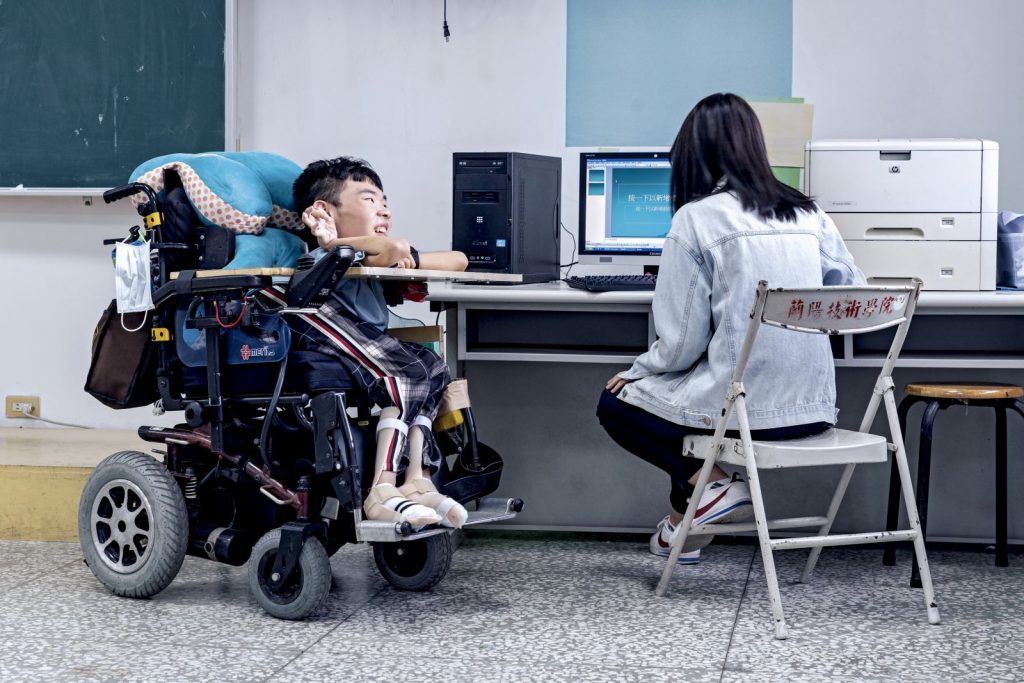
Like his fellow schoolmates, Jing-wei is required to complete ten hours of volunteer work during each semester of his third year in college. He chose to fulfill that requirement by helping other students with their homework.
Encountering Tzu Chi
Jing-wei is now a junior in the Department of Digital Marketing at the Lan Yang Institute of Technology in Yilan County, northern Taiwan. In October 2019, a teacher at his school posted a message to Tzu Chi's website explaining Jing-wei's situation to the foundation—how he was afflicted with a rare disease and how his family was having difficulty affording his school-related expenses. That was how Tzu Chi entered Jing-wei's life.
Soon thereafter, a group of Tzu Chi volunteers and social workers visited Jing-wei at his home to assess his needs. They discovered during their visit that Jing-wei's hands and feet were very cold. They asked him about it, and learned that coldness in the extremities is due to poor circulation brought on by muscular atrophy. Volunteer Huang Li-rong (黃麗蓉) held Jing-wei's hands in hers throughout the visit, hoping to keep them warm with the heat from her hands.
Jing-wei does most of his school assignments on a computer and needs to print them out after finishing them. To make it easier to complete his homework, Tzu Chi volunteers decided to buy a color printer for him. Social worker Lin Jia-lin (林家琳) helped install the printer for him and taught him how to use it. The volunteers also discovered during their visit that the seat of his wheelchair, more than ten years old, was badly worn. They arranged to have it replaced and made sure that the new seat was comfortable to sit on. While replacing the seat, the mechanic noticed that the wheelchair's left rear tire needed replacing too. Volunteers immediately asked him to take care of that too.
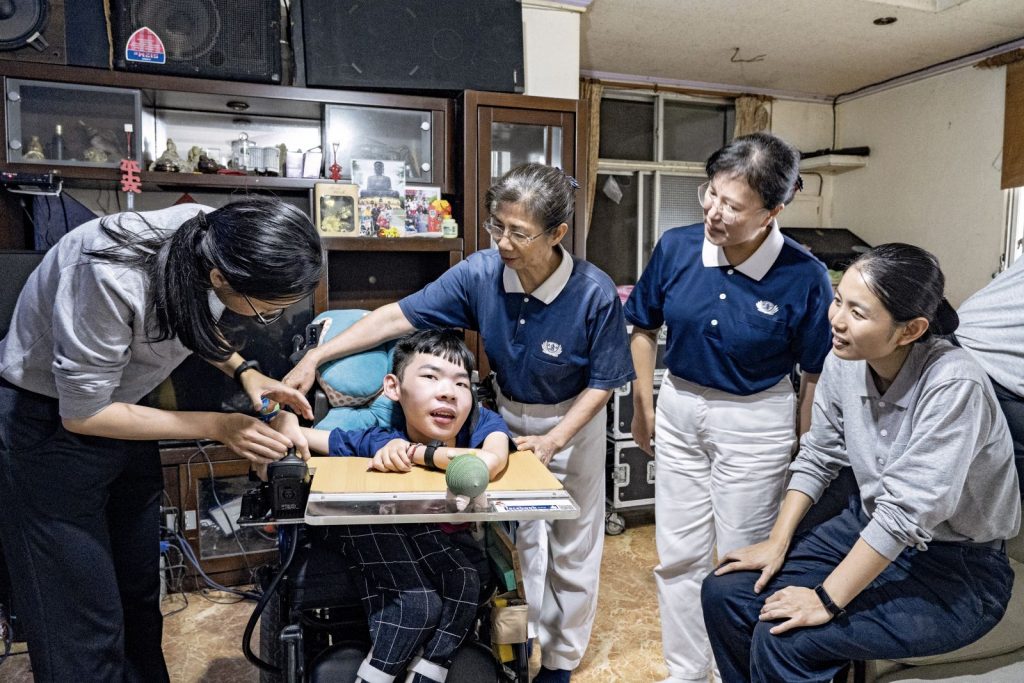
Tzu Chi volunteers check Jing-wei's hands on a visit to his home. They can detect changes to his body caused by his illness during each visit.
Jing-wei couldn't turn his head to check his blind spot when backing up his wheelchair, and he would often bump into people or walls behind him. In response, Tzu Chi paid to have a backup sensor installed for him so he could travel more safely in his wheelchair. Volunteers also visited his school to check the disability facilities there. When they found that his caregiver needed a bed to help him take off and put on his pants in a bathroom, they brought him a Tzu Chi folding bed to serve this need.
Social worker Lin Jia-lin said that Jing-wei turned down Tzu Chi's offer to help with his school fees and transportation costs because he had found sponsors from the business community to cover those expenses. Lin expressed her admiration for Jing-wei's independent spirit. Though he declined Tzu Chi's financial aid, the foundation didn't close his case. Volunteers have continued visiting him and his grandma and providing support whenever they need it. Volunteer Huang Li-zhen (黃麗珍), a hairdresser, even became Jing-wei's "personal hairdresser" after obtaining his permission. She has photographed his head from various angles to design a hairstyle he likes.
The Permanence of Impermanence
"My body is constantly changing with time," Jing-wei said to Tzu Chi volunteers when they visited him in mid-September 2020. "I noticed last week that the index finger on my right hand—the only finger I could move—has begun to get crooked and rigid, making it hard for me to use the mouse." The constant deterioration of his body is the most difficult challenge facing him in life.
He vaguely remembers his time in kindergarten, when he could still raise his hands and sit without back support, but he had lost those abilities by the time he entered elementary school. The challenges brought on by his illness are numerous; in addition to coping with the physical pain in his body, he also faces enormous psychological pressure, induced by fear, worry, and anxiety.
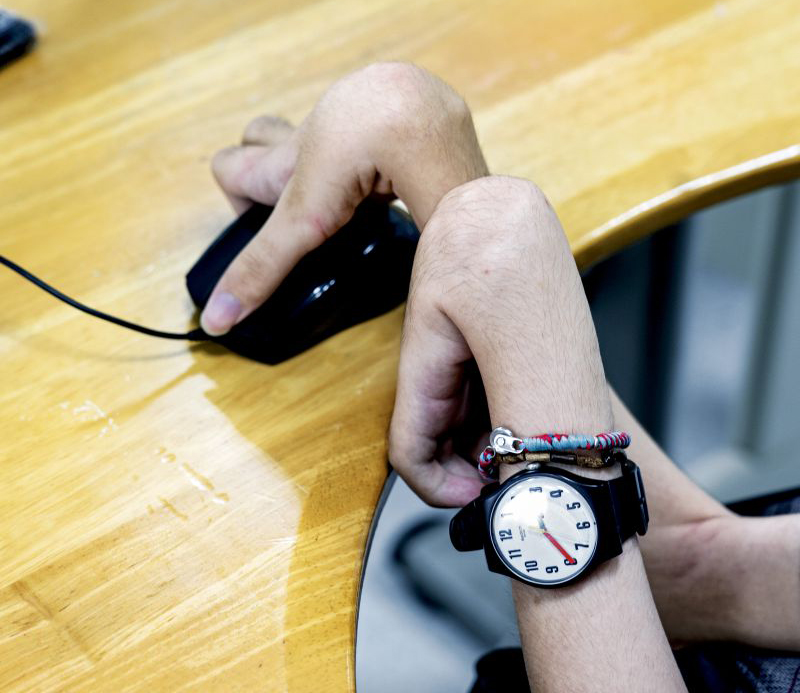
Even though afflicted with spinal muscular atrophy, Jing-wei has never thought of giving up his schooling. His condition prevents him from using his hands to do his homework, so he uses speech recognition technologies for that purpose.
The challenges he faces every day are beyond the imagination of ordinary, healthy people. Take breathing, for example, something most people take for granted. Due to the degeneration of his spinal motor neurons and progressive muscle wasting, he is not only deprived of his mobility—he can't control his own breathing either. He requires a ventilator when he sleeps at night just to stabilize his breathing.
But Jing-wei refuses to let the obstacles he faces bring him down. He does his best to keep a positive attitude. "There lives a 'little devil' in my body," he says. "He always sneaks up and attacks me when I'm not paying attention." Over the years, he has learned how to better live in peace with "the little devil." For example, he knows that his little devil is most active in winter, resulting in frequent visits to the hospital. In order not to let him get his way, Jing-wei is vigilant about eating food rich in vitamin C. He also wears a mask when he is out to protect himself from the flu or other illnesses.
Even though his physical limitations require him to work harder to achieve anything compared with other people, he never uses his disability as an excuse to take the easy way out. When his hand muscles atrophied to such a degree that he could no longer use his hands to do his homework, he turned to speech recognition technologies for help. With the help of technology and by dint of his hard work, he not only does very well in his schoolwork, but he also has been able to obtain several professional licenses, including ones for computer software application and web page editing and design. Recently, he's been preparing for a licensing exam in social media marketing.
Jing-wei says that an understanding of life's impermanence has helped him come to terms with his illness. He says that anyone could be hit by illness; it's just that his illness has lasted longer. He even says with incredibly good cheer: "My condition is like winning a one-in-10,000 lottery. Who could be luckier than me? I must have come into this world with a great mission to accomplish."
One of his dreams is to finish his college education. "I've now finished my first two years in college," he said, "and I've been at the top of my class." Even though he must work hard to cover his monthly expenses of at least 48,000 Taiwanese dollars (US$1,600)—through giving talks, raising money, winning scholarships, etc.—he never complains. His motto is "Follow your own path and make your life worthwhile." He does his best because he doesn't want to leave this world with any regrets.
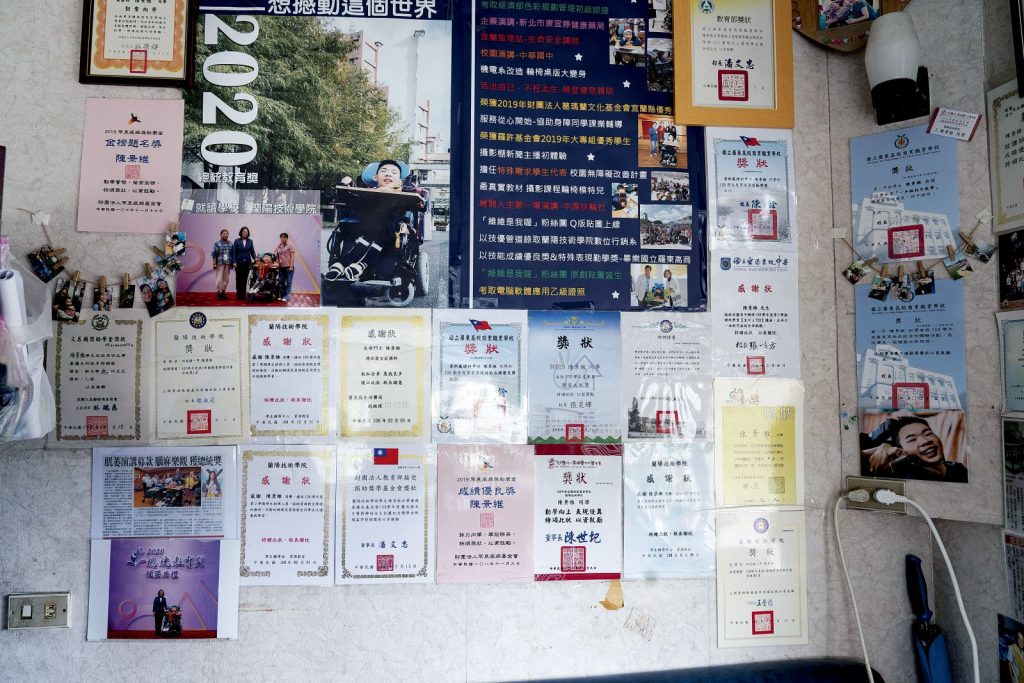
He does very well in school, as evidenced by the certificates of academic excellence peppering the wall pictured here. He has even successfully obtained several professional licenses.
Warm Interactions
Jing-wei's therapist told him during a physiotherapy session that his work ethic was so inspiring he should share his story on social media. Taking his therapist's advice, Jing-wei set up a Facebook fan page on October 26, 2016. He uses Facebook to record his daily life, hoping that his story will encourage everyone not to give up easily on themselves.
Though he set up and runs the fan page to help others, Jing-wei has benefited a lot from it too. The messages left by his fans have greatly cheered him. "Your smile is your best asset," one said. "I have no doubt you will be successful in whatever you do." Another wrote: "Don't ever lose hope. You'll stand up one day." Jing-wei knows well that no cure has yet been discovered for his disease, but messages like these make him hopeful of a miracle.
Another message read, "I felt my heart soar reading your articles. You're really something!" Yet another read, "Some things have happened to me recently that made me want to call it quits. But then I thought of you and remembered our covenant to be brave together. Let's renew that covenant!" Jing-wei said that he knows that his ability to help others is limited, but he is thrilled that his story has the power to move and inspire others and bring some warmth to society. Answering his Facebook messages has become one of the things he enjoys doing most every day.
In 2020, Jing-wei won the Presidential Education Award, which recognizes and honors students who manage to thrive and shine despite difficult circumstances. Award jurors encouraged Jing-wei to dream bigger, and that inspired him to set longer-term goals for himself. "I hope the deterioration of my body will slow down so that I can finish college, publish a book of my own, give a TED talk, and establish a marketing studio at home," he said.
And Jing-wei does more than just dream. When he is not busy with his schoolwork, he accepts invitations to give talks, works on his book, and prepares and sits for licensing exams that will improve his future career prospects. Tzu Chi volunteers and social workers have also worked to help him realize his dreams. They invited him to share his story during a Tzu Chi scholarship award ceremony in October 2020, and the volunteers plan to invite him for more presentations to help prepare him for a bigger stage in the future.
"We're all deeply moved by Jing-wei's resilience and how earnestly he lives his life," said volunteer Huang Li-rong. She remarked that according to doctors, most people suffering from Jing-wei's medical condition do not live past high school age, but Jing-wei hasn't allowed a short life expectancy to dampen his determination to live a full life. Huang felt that she has a lot to learn from the tremendous resilience shown by the young man and the efforts he puts in to bring value into his life.
"Jing-wei is like our teacher," volunteer Huang Li-zhen observed. "He shows us how to be positive and never give up. He says that every day he lives is another day gained." Huang added that Jing-wei always has a smile on his face whenever she sees him. It's impossible not to be infected by his positive energy.
Jing-wei remembers that it was at the end of 2019 that Tzu Chi came into his life. A group of volunteers and social workers visited him at his home. "Even though it was the first time we met," he said, "I immediately felt close to them. The volunteers and social workers are like my family, infusing a lot of positive energy into me."
He learned later that the volunteers have jobs of their own and use their time off work to serve others. "They are trying to make a difference in others' lives via their volunteer work—just like what I hope to do via my talks," he said. Seeing how the volunteers are doing what they can to help others makes him feel that he is doing the right thing in trying to reach out and touch other lives. "I feel so lucky and blessed to have encountered the volunteers and social workers," he said. "I'm deeply grateful."
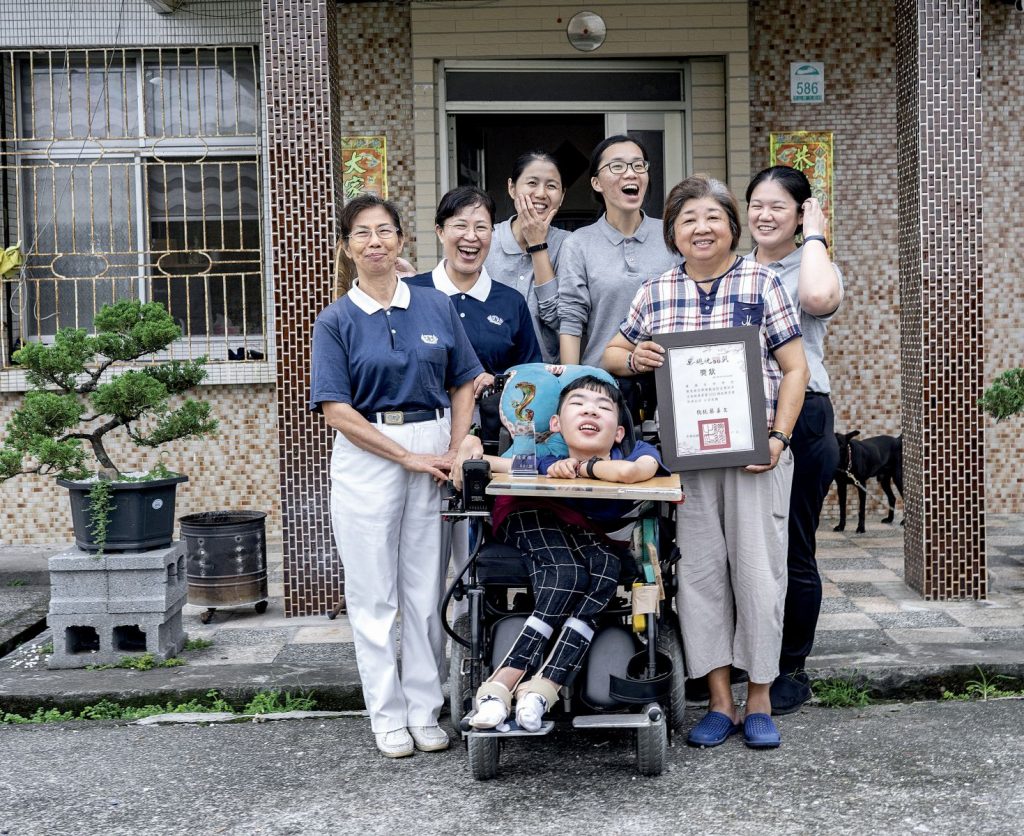
Jing-wei and his grandma (second from right) pose with visiting Tzu Chi volunteers for a picture in front of their home. His grandma is holding the Presidential Education Award that Jing-wei received in 2020.
Contact Us | Plan a Visit | Donate
8 Lide Road, Beitou 11259, Taipei, Taiwan
886-2-2898-9999
005741@daaitv.com
©Tzu Chi Culture and Communication Foundation
All rights reserved.
